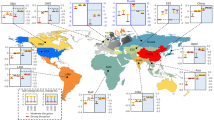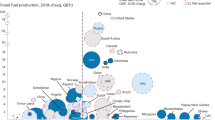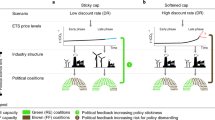Abstract
Oil-exporting states in the Middle East and North Africa have launched reforms of long-standing energy subsidies thought to comprise an important source of legitimacy for autocratic regimes. The actions challenge enduring academic assumptions of the illegitimacy of retrenchment in polities underwritten by hydrocarbon rents. Here, I argue that a series of converging trends provided political cover for the reforms, including fiscal stress from low world oil prices, escalating regional instability, international environmental pressure, as well as untenable growth in domestic consumption of exportable commodities. While the reforms signal an important shift in state–society relations, the new policies appear to be designed to update — rather than jettison — rent-based autocratic governance.
This is a preview of subscription content, access via your institution
Access options
Access Nature and 54 other Nature Portfolio journals
Get Nature+, our best-value online-access subscription
$29.99 / 30 days
cancel any time
Subscribe to this journal
Receive 12 digital issues and online access to articles
$119.00 per year
only $9.92 per issue
Buy this article
- Purchase on Springer Link
- Instant access to full article PDF
Prices may be subject to local taxes which are calculated during checkout




Similar content being viewed by others
References
Beblawi, H. & Luciani, G. (eds) in The Rentier State 1–21 (Croom Helm, London, 1987).
Crystal, J. Oil and Politics in the Gulf: Rulers and Merchants in Kuwait and Qatar (Cambridge Univ. Press, Cambridge, 1990).
Gause III, F. G. Oil Monarchies: Domestic and Security Challenges in the Arab Gulf States (Council on Foreign Relations, 1994).
Gause III, F. G. in The Persian Gulf at the Millennium (eds Sick, G. & Potter, L.) 61–84 (St. Martin’s, New York, 1997).
Herb, M. All in the Family: Absolutism, Revolution, and Democracy in Middle Eastern Monarchies (SUNY Press, New York, 1999).
Okruhlik, G. Rentier wealth, unruly law, and the rise of opposition: the political economy of oil states. Comp. Polit. 31, 295–315 (1999).
Beblawi, H. in The Rentier State (eds Beblawi, H. & Luciani, G.) 85–98 (Croom Helm, London, 1987).
Luciani, G. in The Rentier State (eds Beblawi, H. & Luciani, G.) 63–82 (Croom Helm, London, 1987).
Chaudhry, K. A. The Price of Wealth: Economies and Institutions in the Middle East (Cornell Univ. Press, New York, 1997).
Ross, M. L. Does oil hinder democracy? World Polit. 53, 325–361 (2001).
Smith, B. Oil wealth and regime survival in the developing world, 1960–1999. Am. J. Polit. Sci. 48, 232–246 (2004).
Herb, M. No representation without taxation? Rents, development, and democracy. Comp. Polit. 37, 297–315 (2005).
Schlumberger, O. in Dead Ends of Transition (eds Dauderstadt, M. & Schildberg, A.) 100–113 (Campus Verlag, Frankfurt, 2006).
Schwarz, R. The political economy of state-formation in the Arab Middle East: rentier states, economic reform, and democratization. Rev. Int. Polit. Econ. 15, 599–621 (2008).
Gause III, F. G. Saudi Arabia in the New Middle East Special Report No. 63 (N. Y. Council on Foreign Relations, 2011).
Farsoun, S. K. Oil, state, and social structure in the Middle East. Arab Stud. Q. 10, 155–175 (1988).
Gurr, T. R. Why Men Rebel (Princeton Univ. Press, Princeton, New Jersey, 1970).
Davidson, C. M. After the Sheikhs: The Coming Collapse of the Gulf Monarchies (Hurst, London, 2012).
Gengler, J. & Lambert, L. A. Renegotiating the ruling bargain: selling fiscal reform in the GCC. Middle East J. 70, 321–329 (2016).
Jones, C. W. Economic, Social, and Political Attitudes in the UAE: A Comparison of Emirati and Non-Emirati Youth in Ras al Khaimah (The Sheikh Saud Bin Saqr Al Qasimi Foundation for Policy Research, 2011).
Seznec, J.-F. Saudi Energy Changes: The End of the Rentier State (Atlantic Council, 2016).
Abdulla, A. Contemporary Socio-Political Issues of the Gulf Arab Moment (Kuwait Programme on Development, Governance and Globalisation in the Gulf States, London School of Economics, 2010).
Gray, M. A Theory of ‘Late Rentierism’ in the Arab States of the Gulf (Georgetown University Center for International and Regional Studies, 2011).
Victor, D. G. The Politics of Fossil-Fuel Subsidies (International Institute of Sustainable Development, 2009).
Tabatabai, H. The basic income road to reforming Iran’s price subsidies. Basic Income Stud. 6, 1–24 (2011).
Guillaume, D., Zytek, R. & Farzin, M. R. Iran: The Chronicles of Subsidy Reform (International Monetary Fund, 2011).
Krane, J. Stability versus Sustainability: Energy Policy in the Gulf Monarchies (University of Cambridge, 2014).
Water & Electricity Tariffs 2017 go.nature.com/2Gd5WTx (Abu Dhabi Distribution Co., 2017).
Kingdom of Saudi Arabia Fiscal Balance Program: Balanced Budget 2020 go.nature.com/2DGVE8J (2017).
Feteha, A. & Fattah, Z. Main features of Saudi Arabia 2017 budget, 2016 performance. Bloomberg go.nature.com/2CSyDzh (2016).
Saudi hikes gasoline prices, hard on heels of electricity tariffs rise. MEES 61, 5–6 (2018).
Alyousef, Y. & Stevens, P. The cost of domestic energy prices to Saudi Arabia. Energy Policy 39, 6900–6905 (2011).
Mehrara, M. Energy consumption and economic growth: the case of oil-exporting countries. Energy Policy 35, 2939–2945 (2007).
Bourland, B. & Gamble, P. Saudi Arabia’s Coming Oil and Fiscal Challenge go.nature.com/2ICZMdI (Jadwa Investment, 2011).
Krane, J. Reforming end-user energy prices could rationalize GCC energy demand. Oxford Energy Forum 102, 38–41 (2015).
Oman LNG faces further revenue downside. MEES 58, http://archives.mees.com/issues/1582/articles/52740 (15 May 2015).
Fineren, D. Oman oil minister slams Gulf culture of energy subsidies. Reuters go.nature.com/2F6yESb (10 November 2013).
Dourian, K. Saudi Arabia warns domestic oil use growing at ‘frightening level’. Platts go.nature.com/2FLLuGG (26 November 2012).
Pierson, P. The new politics of the welfare state. World Polit. 48, 143–179 (1996).
Kaufmann, D., Kraay, A. & Mastruzzi, M. Worldwide Governance Indicators: Political Stability and Absence of Violence/Terrorism (World Bank, 2017).
Gibney, M., Cornett, L., Wood, R., Haschke, P. & Arnon, D. The Political Terror Scale 1976–2015 (The Political Terror Scale, 2016).
al-Qassemi, S. The Gulf’s New Social Contract (Middle East Institute, 2016).
Krane, J. & Monaldi, F. Oil Prices, Political Instability, and Energy Subsidy Reform in MENA Oil Exporters (Baker Institute for Public Policy, Rice University, 2017).
Krane, J. & Hung, E. Energy Subsidy Reform in the Persian Gulf: The End of the Big Oil Giveaway (Baker Institute for Public Policy, Rice University, 2016).
Krane, J. in The Economics and Political Economy of Energy Subsidies (ed. Strand, J.) 191–222 (MIT Press, Cambridge, Massachusetts, 2016).
Krane, J. Stability versus sustainability: energy policy in the Gulf monarchies. Energy J. 36, 1–21 (2015).
Moss, T., Lambert, C. & Majerowicz, S. Oil to Cash: Fighting the Resource Curse with Cash Transfers (Center for Global Development, 2015).
Hertog, S. Making wealth sharing more efficient in high-rent countries: the citizens’ income. Energy Transit. 1, 7 (2017).
Lahn, G. Fuel, Food and Utilities Price Reforms in the GCC: A Wake-up Call for Business (Chatham House, 2016).
Tariff Consumption (Electricity and Cogeneration Regulatory Authority, accessed 22 January 2018); go.nature.com/2FUfeoe
Electricity Consumption Tariff (Saudi Electric Company, accessed 15 September 2017); go.nature.com/2GU5uHu
Water Tariff (National Water Company of Saudi Arabia, accessed 15 September 2017); go.nature.com/2G3tC9q
Statistical Review of World Energy 2016 (BP, 2016).
Author information
Authors and Affiliations
Corresponding author
Ethics declarations
Competing interests
The author declares no competing interests.
Additional information
Publisher’s note: Springer Nature remains neutral with regard to jurisdictional claims in published maps and institutional affiliations.
Rights and permissions
About this article
Cite this article
Krane, J. Political enablers of energy subsidy reform in Middle Eastern oil exporters. Nat Energy 3, 547–552 (2018). https://doi.org/10.1038/s41560-018-0113-4
Received:
Accepted:
Published:
Issue Date:
DOI: https://doi.org/10.1038/s41560-018-0113-4
This article is cited by
-
Political ratings, government quality, and liquidity: evidence from Non-U.S. energy stocks listed on the NYSE
Journal of Economics and Finance (2024)
-
Multicriteria optimization for electric vehicles in an arid oil state based on a triple bottom line approach
The International Journal of Life Cycle Assessment (2022)



